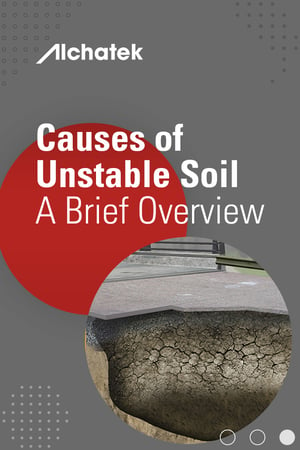
 Unstable soil can be defined as soil that will not stay in place on its own and therefore requires extra support. It should be noted that unstable soil can threaten the stability, security, and safety of infrastructure and can damage, degrade, and even destroy a number of structures, such as buildings, bridges, and roads.
Unstable soil can be defined as soil that will not stay in place on its own and therefore requires extra support. It should be noted that unstable soil can threaten the stability, security, and safety of infrastructure and can damage, degrade, and even destroy a number of structures, such as buildings, bridges, and roads.
Let's look at the four main causes of unstable soil...
Erosion
Erosion refers to processes in which external elements (wind, water, etc.) remove soil or rock from a certain location and transport it to another location. There are a variety of different erosion types, including river and gull erosion, wind erosion, and erosion attributed to human activity. Erosion ultimately destabilizes soil and can lead to landslides and sinkholes.
Poor Compaction
One of the most common causes of unstable soil is poor compaction. In some cases, certain types of soil are simply very loose and subsequently not compact. The cause of this is typically an imbalance of mineral pieces, organic matter, air, and water. For example, clay soil with very high moisture content will inevitably become unstable, as it will be incredibly difficult to compact. Similarly, soils with high sand content will be difficult to compact.
Freeze/Thaw
Processes of freezing and thawing essentially accelerate erosion processes. Cold weather freezes moisture trapped in tiny cracks. When this water freezes, it expands, subsequently pushing on the rocks and breaking them into smaller pieces. As processes of freezing and thawing continue, rock and sediment are continually broken down.
Decomposition
When soils contain a high concentration of organic materials, such as topsoil and plant matter, they will decompose, subsequently causing them to become unstable. This is because organic materials rapidly change form and mass as they decompose in the soil. In fact, up to 90 percent of organic material will disappear over the course of the decomposition process.
Fortunately, stability can be restored to soil with ultra-low viscosity polyurethane resins. Foaming and permeation polyurethanes can mitigate the damage done by processes of erosion, decomposition, freezing, and thawing, as well as help to rectify compaction problems. When it comes to unstable soil, you can’t afford to take a risk. Stable soil is crucial to maintaining secure structures.


